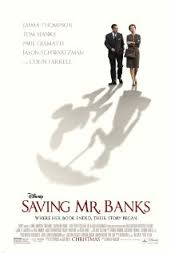By: Mary Fran Bontempo
 It’s not quite Supercalifragilisticexpialidocious, but it’s pretty close.
It’s not quite Supercalifragilisticexpialidocious, but it’s pretty close.
Saving Mr. Banks, one of the Disney Studio’s offerings for the holiday season (the animated Frozen being the other), is the tale of how the magical, whimsical, delightful film, Mary Poppins, almost didn’t get made.
P.L. Travers, creator of Mary Poppins and author of the series of books depicting the character, resisted the wooing of one Walt Disney for the better part of twenty years as the mogul cajoled, begged and pleaded with Travers for the rights to take Travers’ beloved Mary Poppins and make the book into a movie.
To Travers, Mary Poppins was “family,” not to be trifled with or trivialized by the creator of a talking mouse. And were it not for a seriously dwindling bank account, the author would never have considered parting with her characters. But money is money, and when faced with the threat of losing her home, Travers has no choice but to fly to Los Angeles and face Walt and all of his persuasive power.
But Travers is no easy mark, and the dance between Travers, Disney, and his minions (oops, wrong movie), is tense indeed.
Emma Thompson’s Travers is a sour and occasionally nasty woman for whom it’s difficult to feel sympathy. But as the movie unfolds and Travers’ difficult childhood with an alcoholic father is revealed, it’s easier for the viewer to understand her reluctance to relinquish what she feels is a part of herself.
Tom Hanks, as always, is spot-on as Walt–there is no Mr. Disney, as the businessman insisted on familiarity, further rankling the prim and proper Travers, who is never the least impressed by him, even when he offers a private tour of Disneyland. Given Travers’ intense dislike for any form of animation, it’s hardly surprising that Disneyland failed to move her.
Yet, as we all know, Disney eventually wins the day, making a movie that Travers never liked, but legions have loved.
Saving Mr. Banks is a movie about the making of a movie, but it’s also about redemption–P.L. Travers’ lifelong efforts to come to grips with her ne-er do well but loving father. Viewed from that lens, Mary Poppins takes on a new meaning as well.
I’ve seen Mary Poppins dozens of times over the years and it’s hard to imagine life without the dancing penguins (which Travers absolutely detested) or Dick Van Dyke (also poo-poohed by the author) as Bert. And while I’m usually only to glad to root for the little guy, this time, I’m thrilled the giant corporation came out on top. Chim-chim-cheree!
Check out the 50th(!) anniversary edition of Mary Poppins here on Amazon!







Leave A Comment